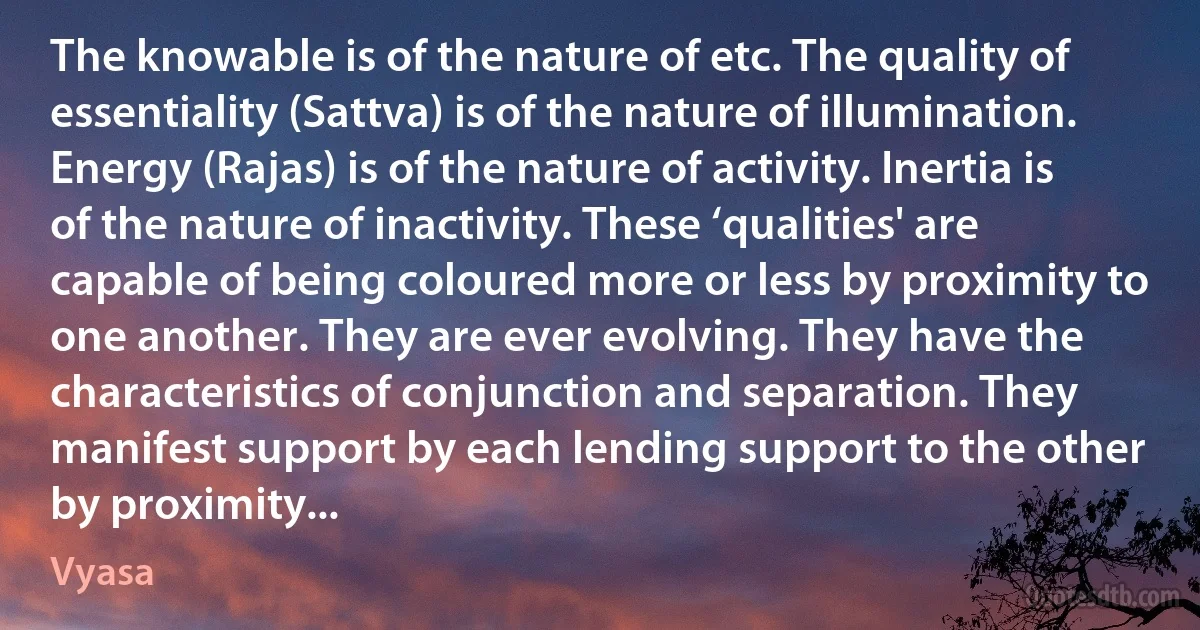Conjunction Quotes - page 2
The knower is the Purusa (the conscious principle) who cognizes the reflection from the Will-to-know by conjunction. The knowable consists of all the characteristics present in the essence of the Will-to know. This, then the knowable behaves like a magnet. It is useful only when placed here. On account of its capacity of knowability, it becomes the possession of the lord, the Purusa, who is of the nature of power of knowing. It becomes the object of the act of enjoyment, in as much as although by nature independent, it becomes dependent on another, existing as it does for fulfilling the object of that other.... The conjunction therewith is the cause, by giving that up is secured the complete remedy of pain, in as much as that is found to be the cause of removal the real thing, the cause of pain.

Vyasa
Conjunction is that which brings about the recognition of the natures of the power of owning and the capacity of being owned. The Purusa is the owner. The knowable' is whatever is owned. The former is conjoined to the latter for the purpose of knowing. The cognition of the knowable which follows from that conjunction is enjoyment. The knowledge, however, of the nature of knower is emancipation. Conjunction therefore ends when it has caused knowledge. Knowledge, is therefore, called the cause of separation. Knowledge is the contradictory of ignorance. Therefore, ignorance is, therefore, is said to be the reason for conjunction. Her knowledge is not the cause of freedom (Moksa); because the absence of Ignorance itself, meaning as does the absence of bondage, is freedom (Moksa)...

Vyasa
Upon the whole, I cannot help thinking the garrison is of advantage; and I cannot conceive the garrison to be in any great danger. The men can be brought off at any time, but the stores may not be so easily removed; yet I think they can be got off, in spite of them, if matters grow desperate. This post is of no importance only in conjunction with Mount Washington. I was over there last evening. The enemy seem to be disposing matters to besiege the place; but Colonel Morgan thinks it will take them till December expires before they can carry it.

Nathanael Greene
There is nothing in any object, consider'd in itself, which can afford us a reason for drawing a conclusion beyond it; [...] even after the observation of the frequent or constant conjunction of objects, we have no reason to draw any inference concerning any object beyond those of which we have had experience.

David Hume
The record shows, that for nearly thirty years, elements of the U. S. Department of Justice have been engaged in world-wide political targeting of me and my associates. This includes early 1970s operations run in conjunction with Secretary of State Henry A. Kissinger's U. S. State Department. During the last ten years or so of that period, some U. S. officials, and others, have challenged the relevant agencies with some of the evidence which shows, that those prosecutions and correlated harassment of me and my associates, had been clearly fraudulent, politically motivated targeting.

Lyndon LaRouche
Our task in conjunction with the Merchant Navies of the United Nations, and supported by the Allied Air Forces, is to carry the Allied Expeditionary Force to the Continent, to establish it there in a secure bridgehead and to build it up and maintain it at a rate which will outmatch that of the enemy. Let no one underestimate the magnitude of this task.

Bertram Ramsay
Being a former dancer, classical dancer, it informed me as a human being just in terms of the grace I guess. Ballet is a very graceful form of art. You also become very aware of your body and your mind and your body is working in conjunction. That kind of helps you in acting as well. It's not only using your mind, it's like making your mind communicate this character into your body so that you can bring it to life and physicalize it.

Zoe Saldana
In the field of non-Euclidean geometry, Riemann... began by calling attention to a distinction that seems obvious once it is pointed out: the distinction between an unbounded straight line and an infinite line. The distinction between unboundedness and infiniteness is readily illustrated. A circle is an unbounded figure in that it never comes to an end, and yet it is of finite length. On the other hand, the usual Euclidean concept of a straight line is also unbounded in that it never reaches an end but is of infinite length.
...he proposed to replace the infiniteness of the Euclidean straight line by the condition that it is merely unbounded. He also proposed to adopt a new parallel axiom... In brief, there are no parallel lines. This ... had been tried... in conjunction with the infiniteness of the straight line and had led to contradictions. However... Riemann found that he could construct another consistent non-Euclidean geometry.

Morris Kline
Dr. Misra cities Firishta as follows: "In the year A. H. 435 (A. D. 1043) the Raja of Delhy, in conjunction with other Rajas took Hansy, Thanesur, and other dependencies from the governors to whom Modood (the successor of Masud) had entrusted them. The Hindus from thence marched towards the fort of Nagarkota [Kangra] which they besieged for four months and the garrison being distressed for provisions and no succour coming from Lahore was under the necessity of capitulating. The Hindus according to their practice erected new idols... The successor of the Raja of Delhy gave such confidence to the Indian chiefs of Punjab and other places that... they put on the aspect of lions.

Firishta
Art is an expression and stimulus to the imaginative life rather than a copy of actual life. Art appreciates emotion in and for itself. The artist, is the most constantly observant of his surroundings and the least affected by their intrinsic aesthetic value. As he contemplates a particular field of vision the aesthetically chaotic and accidental conjunction of forms and colours begin to crystallize into a harmony.

Roger Fry
[The present Government] believes in the supremacy (baasskap) of the European in his sphere, [and] equally in the supremacy (baasskap) of the Bantu in his own sphere. There is thus no policy of oppression here, but one of creating a situation which has never existed for the Bantu; namely, that, taking into consideration their languages, traditions, history and different national communities, they may pass through a development of their own. ... The future Bantu towns and cities in the reserves may arise partly in conjunction with Bantu industries of their own in those reserves. In their establishment Europeans must be prepared to help with money and knowledge, in the consciousness that such industries must, as soon as possible, wholly pass over into the hands of the Bantu.

Hendrik Verwoerd
The size of a firm influences its competitive policies in a number of ways. In the first place the scale of its purchases and sales relative to the total volume of transactions in the firm's market is one indication of the extent of its market control. Taken in conjunction with other data it may throw a good deal of light on price and production policies. Certain authorities, on the other hand, brush aside figures on the relative size of firms as irrelevant and emphasize the decisive importance of the elasticity of the firm's demand curve. 3 It would no doubt be extremely convenient if economists knew the shape of individual demand and cost curves and could proceed forthwith, by comparisons of price and marginal cost, to conclusions regarding the existing degree of monopoly power. The extent to which the monopoly theorists, however, refrain from an empirical application of their formulae is rather striking.

Edward S. Mason
Most of the early Christian writers thought the text "I and my Father are one," was to be understood of an unity or harmony of disposition only. Thus Tertullian observes, that the expression is unum, one thing, not one person; and he explains it to mean unity, likeness, conjunction, and of the love that the Father bore to the Son. Origen says, "let him consider that text, 'all that believed were of one heart and of one soul,' and then he will understand this, 'I and my Father are one".

Joseph Priestley

![Tony Cairo [English abstract sculptor] and I tried to collaborate at several points and it hasn't been successful. As a matter of fact, recently Tony has made sculpture that I have painted. He has to make the sculpture before I can paint it. That means that the form is taking precedence – that the material takes precedence as a form, rather than color establishing the form. It's not going to well but I'm working on it. There's something about color that is so abstract that it is difficult for it to function in conjunction with solid form... Color has properties of weight, density, transparency, and so forth. And when it also has to be compatible with things that have an actual density, a given form, it's very difficult. (Kenneth Noland)](https://cdn.quotesdtb.com/img/quotes_images_webp/27/kenneth-noland-abstract-actual-851727.webp)

